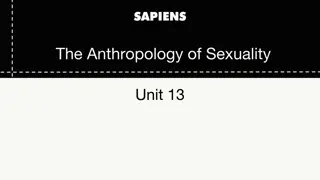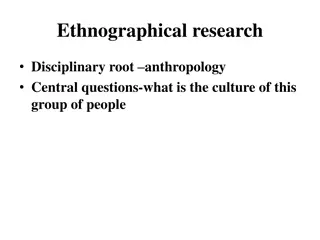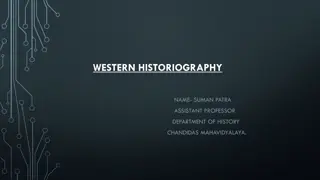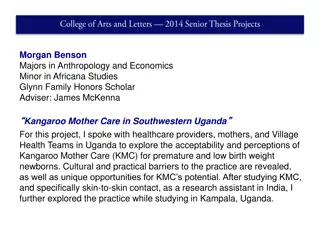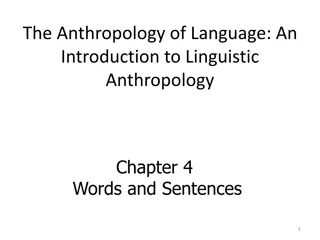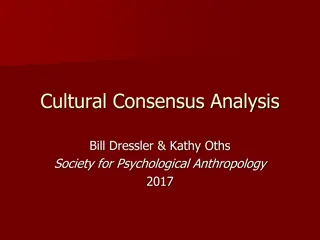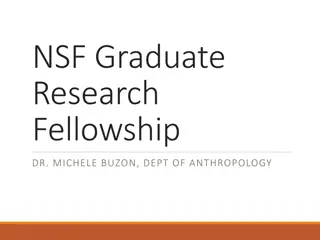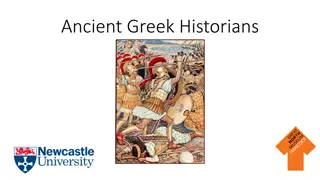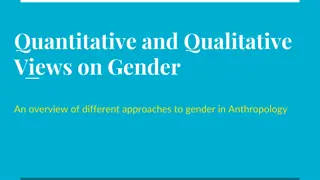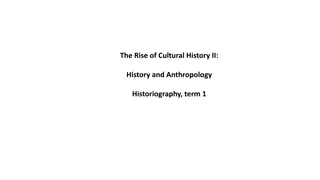Evolution of Anthropology: From Herodotus to Modern Times
Anthropology has evolved over centuries, with roots tracing back to ancient Greeks like Herodotus. The discipline developed into a scientific field during the European Enlightenment and has since progressed to study the science of humanity and cultural differences. Philosophers like Plato and Aristotle also contributed to shaping anthropological thought, emphasizing the importance of understanding and appreciating diverse cultures.
Download Presentation

Please find below an Image/Link to download the presentation.
The content on the website is provided AS IS for your information and personal use only. It may not be sold, licensed, or shared on other websites without obtaining consent from the author. Download presentation by click this link. If you encounter any issues during the download, it is possible that the publisher has removed the file from their server.
E N D
Presentation Transcript
By Dr. Suresh Chandra Murmu Associate Professor Dept of Anthropology, Utkal University Email: smurmu10@gmail.com
How long have anthropologists existed? The answer depends, largely, on what one means by an anthropologist. We start an anthropological inquiry the moment a foreigner move into the neighbours flat.
Anthropology as a Scientific Discipline Different opinions come: European Enlightenment during the 18thcentury. Anthropology did not arise a science until the 1850s. Anthropological research in its present day sense only commenced after the first WW.
Anthropology as the Science of Humanity Originated in the region we commonly called the West . France Great Britain USA Germany This is a European discipline which occasionally trace its root back to the ancient Greeks.
Herodotus and Other Greeks As a young man Herodotus used to travel and gained an intimate knowledge of many foreign people that the Greeks had contact. Wrote detailed travel narratives from various parts western Asia and Egypt and from northern cost of Black Sea. He was sometimes a prejudiced and ethnocentric civilized man. He also acknowledged that different people have different values under different circumstances. He wrote about language, dress, political and judicial institutions, crafts and economics are highly readable today.
How should we relate to the others ? Are they basically like ourselves or they are different ? Paradox of Universalism and Relativism Universalist: Commonalities and Similarities Relativist: Uniqueness and particularity
Plato Dialogues don t directly deal with cultural differences. Cross-cultural encounters were part of everyday life in city-states.
Aristotle Nature of humanity In his philosophical anthropology he discussed the differences between humans in general and animals and concluded that although humans have several needs in common with animals, but only man possesses reason, wisdom and morality. Humans are fundamentally social by nature.
Ibn Khaldun (1332-1406) Wrote massive history of Arabs and Berbers Developed one of the first non-religious social theories and anticipated Emile Durkheim s ideas about social solidarity. Importance of kinship and religion in creating and maintaining sense of solidarity and mutual commitment among the members of group.
European writings from late medieval periods Marco Polo: Expedition to China, allegedly spent 17 years. Great Journey through Western Asia described in The Voyage and Travels of Sir John Mandeville, Knight by an unknown English man in fourteenth century. These two books stimulated the European interest in alien people and customs.
Impact of European Conquest Great Discoveries Henry the Navigator s exploration of the west coast of Africa in early 15thcentury. Columbus five journeys to America (1492-1506) Magellan s circumnavigation of the World (1519-22) Descriptions reached wide audience since the printing invented in 1448 Michel de Montaigne coined the the noble savage Glimps Cultural relativism in his writings.
The Others became increasingly visible in European cultural life. From Descartes (1596 1650) to Nietzsche (1844 1900) developed his own doctrine of human nature, his own philosophical anthropology, often basing it directly on current knowledge and beliefs about non-European peoples.
Philosophical Controversy between Empiricists and Rationalists 17th & 18th Century Empiricist: British Philosopher John Locke Human mind is blank slate at birth All our ideas, values and assumptions are the result of our experiences or sense impressions of the world. People are not born different, but become different through differing experiences. Epistemological groundwork of a science of society that combines a universalistic principle (we are all born the same) and a relativistic principle (our differing experiences make us different)
Rationalist: Ren Descartes In anthropology he is particularly noted for the sharp distinction he drew between consciousness and spiritual life on the one hand, and the material world and the human body on the other. Our images of the outside world are just that images and as such they are deeply marked by the perceiving subject s pre-existing ideas about the world. We can only see the world through a filter of ideas. I think, therefore I am I can be sure that I exist since I know that I think
WHY ALL THIS IS NOT QUITE ANTHROPOLOGY YET ? Exotic peoples had been described normatively (ethnocentrism) or descriptively (cultural relativism). The question had repeatedly been raised whether people everywhere and at all times are basically similar (universalism) or profoundly different (relativism). First, that all the work mentioned so far belongs to one of two genres: travel writing and social philosophy. It is only when these two aspects of anthropological inquiry are fused, i.e. when data and theory are integrated, that anthropology appears.
Second, and perhaps more controversially, we call attention to the fact that all the writers mentioned so far are influenced by their times and their society. The discipline is a product, not merely of a series of singular thoughts such as those we have mentioned above, but of wide ranging changes in European culture and society. First, we have seen that the encounter with the other stimulated European intellectuals to see society as an entity undergoing change and growth, from relatively simple, small-scale, local communities, to large, complex, industrial nations. The individual, too, could develop, through education and career, by refining his personality and finding his true self .
In the 19th century that anthropology became an academic discipline 20th century that it attained the form in which it is taught to students today Seeds were sown in early modern philosophy Important advances were made in the 18th century
Enlightenment Traditional religious beliefs were increasingly denounced as superstitions roadblocks on the way to a better society, governed by reason. The idea of progress also seemed to be confirmed by the development of technology, which made its first great advances at this time. New technologies made scientific measurements more accurate. Industrial machinery began to appear.
Giambattista Vicos (16681744) La scienza nuova (1725; The New Science, 1999). This was a grand synthesis of ethnography, history of religion, philosophy and natural science. Universal model of social development: Age of Gods, Age of Heroes and Age of Man
In France that the first steps were taken towards the establishment of anthropology as a science. In 1748, Baron de Montesquieu (1689 1755) published his De l esprit des loix (The Spirit of Laws, 1977). This is a comparative, cross-cultural study of legislative systems. Montesquieu pictures the legal system as an aspect of the wider social system, intimately entwined with many other aspects of the larger whole (politics, economy, kinship, demography, religion. described his own society from the point of view of an outsider.
Idealistic French Intellectuals (Encyclopaedists) Philosopher Denis Diderot Mathematician Jean Le Rond d Alembert Jean Jacques Rousseau, one of the Contributors in Diderot s Encyclopaedia. Argued that development was not progressive, but degenerative, and that the source of this decline was society itself. Man was born free, but is everywhere in chain Rousseau s ideal society was to be found among the noble savages , the free, stateless peoples .
Romanticism The Enlightenment believed in the individual and the rational mind. Romantic thought, in contrast, shifted its attention from the individual to the group, from reason to emotion. Johann Gottfried von Herder: argued that every Volk (people) had its own values, customs, language and spirit (Volksgeist). Distinction between culture and civilisation: culture was seen as experiential and organic, while civilisation was cognitive and superficial.
Herders concept of the Volk was refined and politicised by later philosophers, including Fichte (1762 1814) and Schelling (1775 1854), in whose hands it was transformed into a tool for the burgeoning nationalist movements that spread through Europe in the wake of the Napoleonic Wars. But the same concept also entered academia, where it reappeared, early in the twentieth century, as the doctrine of cultural relativism.
Immanuel Kant Kant concurred with Locke and Hume that true knowledge derived from sense impressions, but he also stressed (with Descartes) that sensory data were filtered and shaped by the faculties of the mind. Kant s great achievement was to demonstrate that thought and experience were dynamically related, and that the acquisition of knowledge is a creative process. To know the world is to contribute to its creation, as any anthropologist on fieldwork knows. We sample, shape and interpret reality as we go along, and this process, which Kant was the first to recognise explicitly, continues to generate major debates in anthropology today. Knowledge was a process, a never-ending movement. The fixed point around which this movement flowed was the individual.
Georg Wilhelm Friedrich Hegel (1770 1831) The individual, too, is a part and a result of the process of knowing. Thus, by knowing the world, we create not only a knowable world, but a knowing Self. The world created through knowing is therefore fundamentally collective, and the individual is not its cause, but one of its effects. principle of methodological collectivism emerge the notion that society is more fundamental than the individual. The opposite view, methodological individualism, follows Kant and takes the single person as its starting-point
Social construction of reality remains the most important idea that social science has inherited from Hegel and Kant. It was in this world of upheaval and transition that anthropology first emerged as an academic discipline. An important precondition for this development was the establishment of the first ethnographic museums. But systematic collection of ethnographica only started in the 1800s. Large national museums were established in London (1753), Paris (1801) and Washington, DC (1843), and all of these would eventually develop influential ethnographic departments.
Still, the first specialised ethnographic museums were established in German-speaking areas, notably Vienna (1806), Munich (1859) and Berlin (1868). German academics had, in accordance with Herder s programme, begun to carry out empirical studies of the customs of the people . They collected data on peasant life on folktales and legends, dress and dance, crafts and skills. The earliest museums were thus primarily concerned with Volkskunde (the study of peasant cultures at home) rather than V lkerkunde (the study of remote peoples). Institutionalisation of anthropology commenced in German-speaking areas, rather than in France or Britain a fact that is often neglected in historical accounts of anthropology.
Between the Napoleonic wars (17921815) and the First World War (1914 18), there is rise of modern Europe and of the modern world. The age of the Industrial Revolution. Anthropology arose as a discipline at this time. The anthropologist is a prototypical global researcher, dependent on detailed data about people all over the world. Now that these data had suddenly become available, anthropology could be established as an academic discipline. So could sociology. If anthropology grew from imperialism, sociology was a product of the changing class relations brought about by industrialisation in Europe itself all the founding fathers of sociology discuss the meaning of modernity , and contrast it with pre-modern conditions.
Sydney Slotkin Book: Readings in Early Anthropology Traced the history of many Anthropological sub- disciplines from seventeenth and eighteenth centuries. In his opinion most of the fields of anthropology was developed by the end of eighteenth century. Real professional interest of the subject did not appear until nineteenth century.
In 1800 a society named as Observers of Man was founded in Paris by the union of naturalists and medical men. This society promoted the study of natural history by providing guidance to the travellers and explorers of far places. In 1838 another society for the protection of aborigines was established in London. Aim was political and social, rather than scientific. Mr. Hodgkin in 1839 inaugurated an Ethological Society in Berlin. Milne Edwards, the eminent naturalist took there an active part. Important Facts
In 1841/1843 ?, a similar society was formed in London. Later the third Ethnological Society was founded in New York in 1842. Important Facts The establishment of Ethnological Societies can be taken as an important landmark in the emergence of anthropology.
Charles Darwins Origin of species (1859) perhaps boosted the zeal of all scientists in different fields. His idea not only opened the new avenues for Zoology, Anatomy, Physiology, Philology, Palaeontology, Archaeology and Geology but also accelerated the pace of Socio-Cultural studies. Being influenced by Darwin, a group of intellectuals namely Spencer, Morgan, Tylor reached to the conclusion that evolution did not operate only in case of physical aspects of mankind, but also in cultural life. Accordingly, the year 1859 may be taken as the date of birth of anthropology.
R.R. Marret (1912) termed anthropology as Child of Darwin . In the same year 1859, Paul Broca founded an Anthropological Society in Paris. In 1863, James Hunt established an Anthropological Society in London. Hunt declared anthropology as a whole science of man . In 1863, Thomas Huxley was elected the president of the Anthropological Society. He belonged to the Ethnological society in London for a considerable span of time.
Nearly thirty years, from 1840 to 1870, a great debate continued with the two words Ethnology and Anthropology. International congresses of Anthropology and prehistoric archaeology were held in 1866, 1867 and 1868 in different parts of Europe. Anthropological Institute of Great Britain and Ireland was established in 1871. But in 1873, a new London Anthropological Society came into being. This new society published the Journal Anthropologia
Anthropology in America was not merely an offshoot of European thought. It became an independent centre for the development of anthropology in nineteenth century. Paul Broca in his address The Progress of Anthropology (1869) had pointed out that anatomy along with Biology formed the pivotal base of anthropology. Thomas Jefferson, the third president of United States is said to be the first anthropologist in America. He was the pioneer empirical researcher in archaeology.
England exhibited a great development only in social theories. Spencer, Tylor and Frazer were the renowned names but they are known as the arm-chair anthropologists. However, in later period, we get the scholars like Durkheim, Mauss and others who deliberately tried to avoid the arm-chair speculation. Germany, at first established a psychological and later a geographical tradition of cultural anthropology. All these were empirical studies. Thus, American anthropology got the influence of European anthropology.
The concept of culture given by Sir Edward Burnett Tylor (1832-1917) established anthropology as an academically recognized discipline in Europe. Tylor has been recognized as the father of modern anthropology. Tylor was definitely one of the principal founders of anthropology who forwarded the idea of cultural evolution. Lewis Henry Morgan (1818-1881) of America had also shown the growth of human culture with time.
After the First World War, outlook of anthropology changed greatly. Nineteenth century anthropologists were totally unacquainted with the peoples with whom they were concerned. They used to depend on the data collected by other non-anthropologists like explorers, missionaries, administrators etc. As the anthropologists put forward their propositions sitting merely in their libraries, many speculations were involved there. Bronislaw Malinowski (1884-1942) France Scholar Claude Levi-Strauss
British scholars not only gave a conceptual lead to this field, they first organized the International Congress of Anthropological and Ethnonological Science (ICASES) in 1934 where nine hundred anthropologists, ethnologists and other scientists of allied field from fortythree countries had participated.





